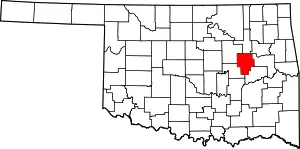Kusa is a populated place located in Okmulgee County, Oklahoma,[1][2] about 4 miles east-northeast of Henryetta.[3] Officially incorporated March 27th, 1916,[4] and located in the Henryetta Coal Mining District,[5] Kusa became a coal mining and lead smelting boomtown, complete with movie theaters, hotels, and banks.[6] It even had its own newspaper, The Kusa Industrial, which published between 1914 and 1920.[7] The population grew to a size of about 3,500, making it the largest town in the county at one point.[4]
While coal mining was the major draw,[4] the town was the site of a 47-acre horizontal retort smelter which processed zinc ore beginning in 1915, but ending in 1928.[8] Brickmaking grew up in the 1920s spurred by the need to make the construction grade bricks, fireclay retorts, and clay condensers that were used in the zinc smelting operation; but, those facilities were cleared by 1949.[9] Along with these shutdowns and the closure of the coal mines,[10] Kusa's anticipated bright future was short-circuited by the railroad bypassing the locale in favor of Henryetta,[4] and later by the highway (Highway 266) bypassing it to the north.[6] The town's incorporation was eventually dissolved,[4] and nothing is now left of the original buildings except foundations, although some people still live in the area.[6]
References
- ↑ "Kusa (in Okmulgee County, OK) Populated Place Profile". HomeTownLocator.com. Retrieved May 13, 2021.
- ↑ "Kusa". Geographic Names Information System. United States Geological Survey, United States Department of the Interior. Retrieved June 3, 2021.
- ↑ "Henryetta, Oklahoma to Kusa, Oklahoma". Google Maps. Retrieved May 13, 2021.
- 1 2 3 4 5 "Oklahoma's secret past-- ghost towns of Oklahoma". Keaton Fox, Fox 25, November 19, 2015. 19 November 2015. Retrieved May 13, 2021.
- ↑ Franks, Kenny Arthur (January 1997). Oklahoma, Its Land and Its People, p41. ISBN 978-0-8061-9944-3. Retrieved May 13, 2021.
- 1 2 3 "KUSA". GhostTowns.com. Retrieved May 13, 2021.
- ↑ "The Kusa Industrial". Newspapers.com. Retrieved May 13, 2021.
- ↑ "The Environmental Legacy of Smelting in Oklahoma". Oklahoma Department of Environmental Quality (DEQ), April 1, 2020. Retrieved May 13, 2021.
- ↑ "Phytoremediation of Heavy Metal Contaminated Soil". CiteSeerX 10.1.1.425.2768.
- ↑ "Cities of Oklahoma, Page 16, Edited by John W. Morris, Oklahoma Historical Society, 1979". 1979. Retrieved May 13, 2021.
